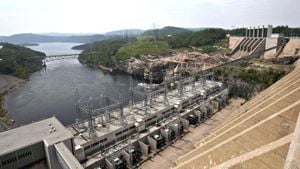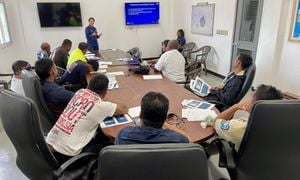Donald Trump, who overcame impeachments, criminal indictments, and assassination attempts to win another term, was sworn in Monday as the 47th president of the United States, claiming control over Washington and launching efforts to reshape the nation’s governance. The inauguration ceremony had to be moved indoors due to frigid temperatures but nonetheless showcased the fervor of Trump's supporters as he delivered promises and initiated major policy changes.
After being inaugurated, Trump held his inaugural parade at Capital One Arena, surrounded by fervent supporters, including prominent tech billionaire Elon Musk, who sat joyfully close during the ceremony. The relationship between Trump and Musk is reminiscent of Trump’s alliances with influential figures, underscoring his approach to governance.
South Korea's acting leader, Choi Sang-mok, expressed hopes for strengthened ties with the new administration, yet voiced concerns over trade policies potentially impacting their economy, reflecting the delicate balance of international relations. Choi’s message on social platform X, congratulating Trump, emphasizes the strategic alliance forged through shared historical contexts.
One of the stark decisions during Trump's swearing-in was the reinstatement of Cuba's designation as a state sponsor of terrorism—a move criticized by Cuban President Miguel Díaz-Canel, who labeled it as arrogance and contempt for truth, arguing this act only exacerbates the economic hardships felt on the island.
Trump's inaugural actions quickly reminded the nation of the contentious nature of his presidency. He signed numerous executive orders, including broader pardons for supporters involved in the January 6 Capitol riot, labelling them “hostages,” indicating his continued loyalty to those who sought to overturn the last election results.
Also stirring debate, Trump issued directives to expedite security clearances for White House aides and raised the possibility of utilizing wartime powers to deport gang members linked to foreign terrorist organizations—reminiscent of actions taken during past conflicts, and exemplifying his tough stance on immigration.
Another significant action was Trump’s executive order halting offshore wind lease sales and imposing strict regulations on new environmental policies, including the assessment of the economic viability of wind projects. His energy policies signal a clear departure from renewable energy commitments made by previous administrations.
Internationally, Taiwan's President Lai Ching-te expressed hopes for continued support from the Trump administration, voicing aspirations for cooperation against external threats, particularly from China. This sentiment highlights the intersection of U.S. foreign policy and its allies’ security concerns.
Trump's controversies were fully displayed when he signed orders limiting immigration, targeting undocumented individuals, and overturning protections related to gender identity, all of which promised to reshape federal policies and impact countless lives. His declaration of national emergencies at the southern border echoed previous border policies aimed at asserting control over immigration flows.
Critics were quick to label Trump’s actions as unjust, especially his pardons and rollbacks, which many saw as disrespectful to law enforcement and against the backdrop of severe national challenges. Former House Speaker Nancy Pelosi lambasted Trump’s prioritization of pardoning insurrectionists, highlighting the significant rift between Trump's actions and those championing law and order.
Trump's administration also began the process to withdraw from the World Health Organization yet again, showcasing his administration's aim to disrupt health initiatives mounted by his predecessor, raising concerns across the public health community. Detractors warn this could roll back significant progress against infectious diseases and compromise global health security.
His stated goal—a restored emphasis on American exceptionalism—finds expression through singular actions like the potential renaming of the Gulf of Mexico to the Gulf of America and proposals for restoring specific geographic names reflecting American identity, such as Denali back to Mount McKinley. Each of these moves reflects Trump's determination to redefine America's image both domestically and internationally.
Overall, Trump's inauguration heralded turbulent times with actions steering the country back toward more conservative stances, challenging the accomplishments of prior administrations. From immigration reform to environmental policies, the choices made during his first hours back signify not just personal governance styles but also the broader political ideologies shaping the nation.
With his re-election promises ringing still, Trump's executive orders elucidated his intention to reshape federal structures fundamentally, indicative of the divided American political theatre moving forward. The ramifications of his decisions are set to resonate across various sectors, impacting political dynamics, social movements, and international relations.
The day concluded underscoring Trump's focus on public engagement, facing the press with fervor, positioning himself as both entertainer and leader, and setting the stage for the controversial and headline-grabbing presidency the nation has witnessed before. This tumultuous uniting of politics and spectacle will surely delineate the next chapters of American governance throughout the 2024 electoral battle and beyond.



